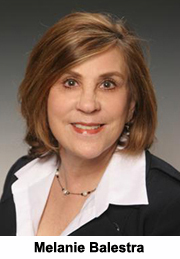Some Advice Worth Repeating to Help NPs Have a Safe and Prosperous 2016
By Melanie Balestra, NP, Esq.

We are starting a New Year with many challenges, including the Legislature’s reconsideration of Senate Bill 323. I cannot stress enough that NPs know their scope of practice and follow Standardized Procedures. As nurses, NPs may tend to be sympathetic and want to help a patient, friend or family member, so may tend to stray from the SPs and Protocols. If discovered and reported, this is almost a guarantee for probation.
Here are some Don’ts to follow:
Don’t treat or prescribe for a patient who has not been seen in your practice. This includes family, friends, neighbors or anyone not a patient.
Don’t give “free” medical advice outside your practice.
Don’t take prescription sample medications home unless this medication is prescribed for you and you have the sample signed out to you as a patient.
Don’t take prescription sample medications to give to friends or family who are not patients in your practice.
Don’t talk to an investigator without an attorney present.
Don’t prescribe or refill a scheduled drug without assessing the patient or having patient’s medical record available.
Don’t treat a patient for mental health problems unless you are certified as a mental health/psychiatric nurse practitioner.
Don’t become defensive when being investigated.
Don’t cut and paste when documenting in the EMR.
Don’t text messages about a patient.
Don’t use social media, i.e. Facebook, to discuss a patient.
Here are some Do’s to Follow:
Do make sure that your SPs are signed by you, the collaborating physician and administrator before starting a job.
Do assess all patients and document in a SOAP or similar documentation.
Do document conversations with patient’s family or legal guardian.
Do stress the importance of being compliant to patients and document your interaction and instructions.
Do document follow-up on all patients.
Do document all phone conversations with patients or conversations with staff if the patient is in a facility.
Do document if a patient insurance has changed that you gave the patient the option to pay you for your services (if your practice does not take the insurance) or call their insurance company to find out providers in the patient’s area who take their insurance. This prevents claims of patient abandonment.
Do email questions about your EMR if you are having problems. This gives a written trail to follow if problems arise in the future.
Do make sure all patient communication is HIPAA compliant.
Do purchase your own malpractice occurrence policy so that you are the one who makes the decisions with your attorney and are covered 24/7.
Do belong to and support your professional organizations.
Do remember that accurate documentation can be your best defense in a medical malpractice lawsuit or disciplinary action.
I know that CANP members can probably come up with some more do’s and don’ts. Please feel free to send them in to Connections. Also, I would like to hear from CANP members about questions they may have or subjects for articles of interest to them. Another thought I had for this upcoming year is to write about situations or case studies involving members of CANP. If you have been involved in an interesting situation or issues that have come to focus in your practice, please let me know through Connections. Last but not least, I hope that everyone has a wonderful and prosperous New Year!